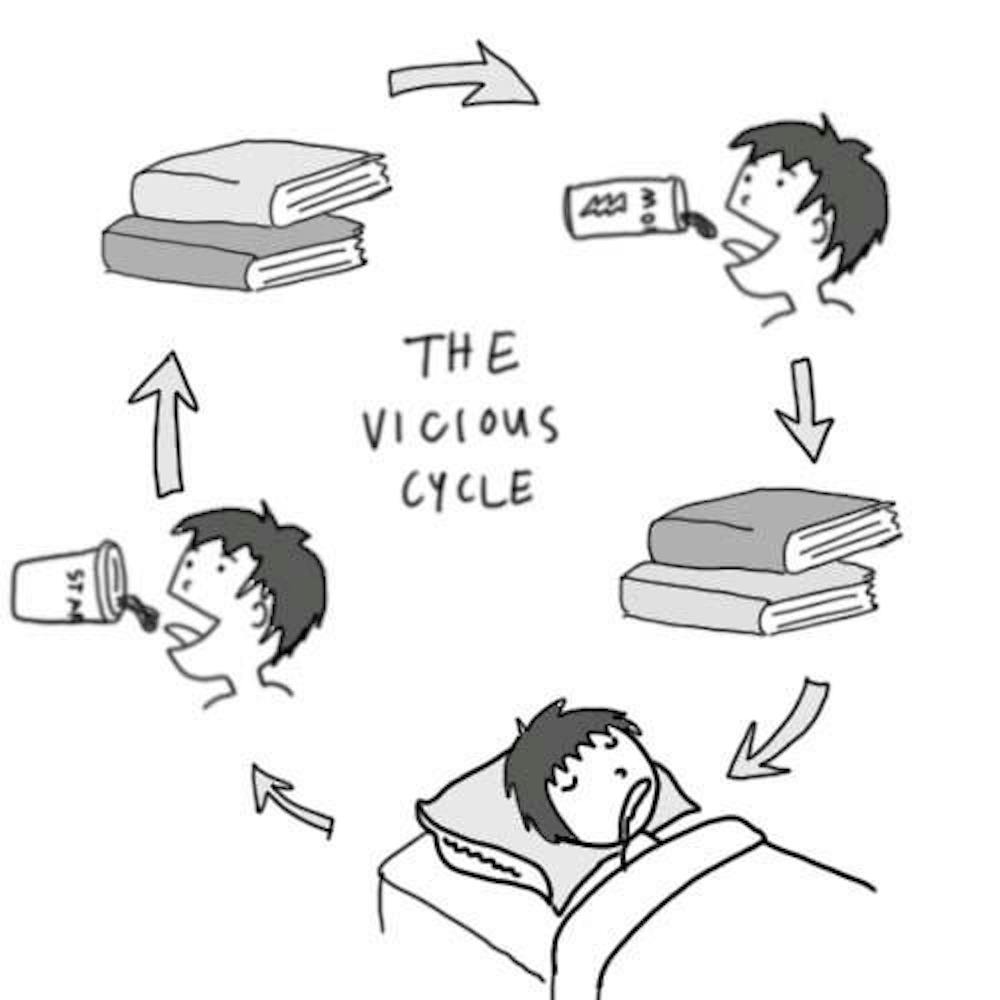(Ann Truong | The Beacon)
By
Anais Fournier went about her weekend routine. Hit the mall, chug a 24 ounce can of Monster and shop the sales.
Her next morning can of Monster would aggrevate a heart condition and end her life. Her routine took her life.
College students live in a world of vicious cycles, and caffeine addiction flies under the radar.
Calling habitual coffee or energy drink consumption an "addiction" might be strong, especially considering the nature of our work. As students we work long into the night and oftentimes have to wake up early in the morning. Adding stimulants to our diet, whether it's a 24 ounce can of Monster or a warm cup of green tea, is a plain necessity for many. However, the Food and Drug Administration is investigating the health risks of highly caffeinated beverages .
Any college student can tell you Monster drinks and massive amounts of coffee are not healthy.
Caffeine can pump up your heart rate, give you the jitters and might make you sweat a little bit in large doses. But on those late nights or early mornings, it sure gets the job done.
The question is, why do we all feel the need to imbibe in energy supplements? Are we overworked? Do we party too hard, or does our environment encourage it?
Maybe it's a little of each.
For starters, we're a more sedentary demographic. Sitting in class, followed by staring at a computer screen doing homework isn't exactly conducive to an active lifestyle (and the rainy weather doesn't help either). In other words, our bodies don't produce the energy we need.
We get stressed, rushed and hassled daily and often eat things that are quick and tasty rather than restorative and healthy. If we're not getting energy from eating and exercise, we naturally turn to caffeine, taurine, ginseng and milk thistle to get our homework done and stay awake in Bibtrad.
We don't sleep. In the choice to finish assignments on time or get the full eight hours recommended per night, school comes first and our REM cycle suffers. More than not exercising and eating unhealthy, sleep loss contributes the most to the caffeine cycle. In our prime, we live like we're asleep because of sleep deprivation.
Can you really blame us? The pressure to perform and do well in college has never been greater. For many of our fields, a graduate degree is the new norm for getting a job and we're already borrowing our futures away to attend University of Portland.
Here is our vicious cycle: We aren't producing enough natural energy from eating well and exercising, and as a consequence rely on caffeine to maintain our high levels of performance.
No wonder Monster drink sales went up 17.8 percent last year. Theirs and similar products are a necessity to the fast-paced lifestyle college students and many Americans live.
The good thing about cycles is if you remove one link, they start to break down.
Even though the work is starting to get its hardest and time its most precious, now is the time to find a physical outlet for all that pent up academic angst. Getting some exercise will lead to greater focus without having to take crash causing energy drinks.
Keeping yourself fueled with real food will help you in the long haul as the cold season bares its ugly head.
The important thing is recognizing the hamster wheel many of us run on. When we structure our day around when the next hit of caffeine will warm our lips, we are giving in to a flawed, unhealthy and unhappy way of living. By making some small changes in the routine, such as getting more sleep, you may find focus and energy without a monstrous crash.
Editorial Policy The editorial reflects the majority view of The Beacon Editorial Board. The editorial does not necessarily reflect the opinions of the collective staff or the Administration of the University of Portland. Other submissions in this section are signed commentaries that reflect the opinion of the individual writer. The Student Media Committee, providing recommendation to the publisher, oversees the general operation of the newspaper. Policy set by the committee and publisher dictates that the responsibility for the newspaper's editorial and advertising content lies solely in the hands of its student employees.









